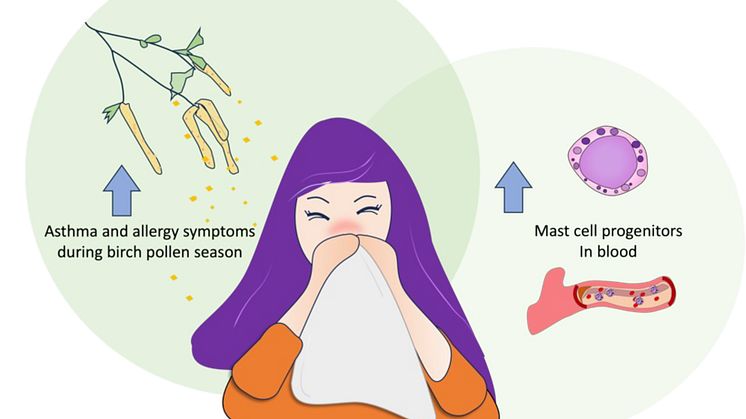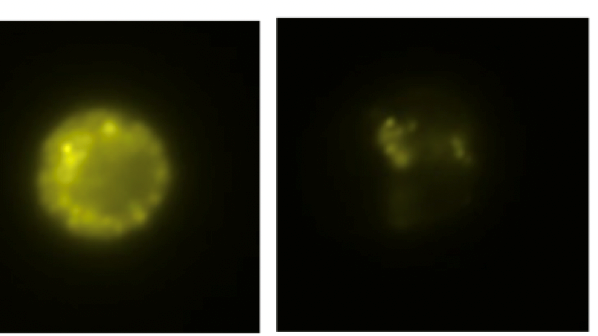
Press release -
More mast cell progenitors during pollen season
The frequency of mast cell progenitors in the blood circulation is higher in asthma patients during the birch pollen season than outside of it. This has been demonstrated in a new study by Uppsala University, published in the scholarly journal Allergy.
The study, which formed part of Abigail Alvarado-Vazquez’s thesis and is a collaboration with researchers at Uppsala University Hospital, shows that the frequency of mast cell progenitors in the blood increases with allergen exposure in asthma patients. It can be linked to increased asthma and allergy symptoms and reduced asthma control.
“This also means that mast cell progenitors in the blood are interesting as a biomarker for asthma,” says Jenny Hallgren Martinsson from the Department of Medical Biochemistry and Microbiology at Uppsala University.
For many years, researchers have been studying how the immune system, including mast cells, responds when exposed to allergens. They have also described how mast cells accumulate in different regions of the lungs in patients with asthma. Hallgren Martinsson’s research team has previously shown that this is due to the migration of mast cell progenitors to the lungs from the bone marrow via the blood. In 2016, they were the first research team in the world to show that mast cell progenitors are also found in the blood of humans, and in a follow-up study they showed that a high prevalence of mast cell progenitors was found in patients with asthma and who had lower lung function.
In the new study, the research team examined patients with birch pollen-induced asthma both during the birch pollen season and outside the season. The prevalence of mast cell progenitors in the blood circulation was found to be higher in the birch pollen season than in the off-season. In addition, those with more severe symptoms and lower levels of asthma control during the birch pollen season had the highest prevalence of mast cell progenitors.
“This suggests that if patients with allergic asthma are exposed to allergens, the bone marrow is stimulated to temporarily release more mast cell progenitors into the bloodstream,” says Hallgren Martinsson.
Article: Alvarado-Vazquez, PA, Mendez-Enriquez, E, Salomonsson, M, et al.; Circulating mast cell progenitors increase during natural birch pollen exposure in allergic asthma patients; Allergy. 2023; 00: 1-10. doi:10.1111/all.15860; https://doi.org/10.1111/all.15860
Contact information:
Abigail Alvarado-Vazquez, Department of Medical Biochemistry and Microbiology, Uppsala University, abigail.vazquez@imbim.uu.se, 070-611 05 74
Jenny Hallgren Martinsson, Department of Medical Biochemistry and Microbiology, Uppsala University, jenny.hallgren@imbim.uu.se, 073-830 37 93
Jenny Hallgren Martinsson's research team
https://www.imbim.uu.se/forskargrupper/infektion-och-immunitet/Hallgren_Martinsson_Jenny/
Topics
Categories
Founded in 1477, Uppsala University is the oldest university in Sweden. With more than 50,000 students and 7,500 employees in Uppsala and Visby, we are a broad university with research in social sciences, humanities, technology, natural sciences, medicine and pharmacology. Our mission is to conduct education and research of the highest quality and relevance to society on a long-term basis. Uppsala University is regularly ranked among the world’s top universities. www.uu.se

